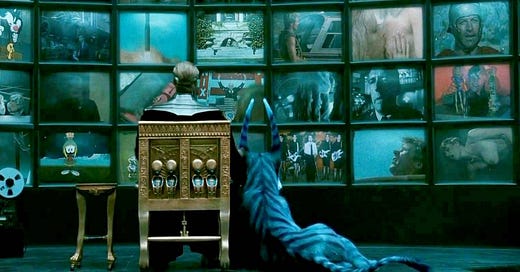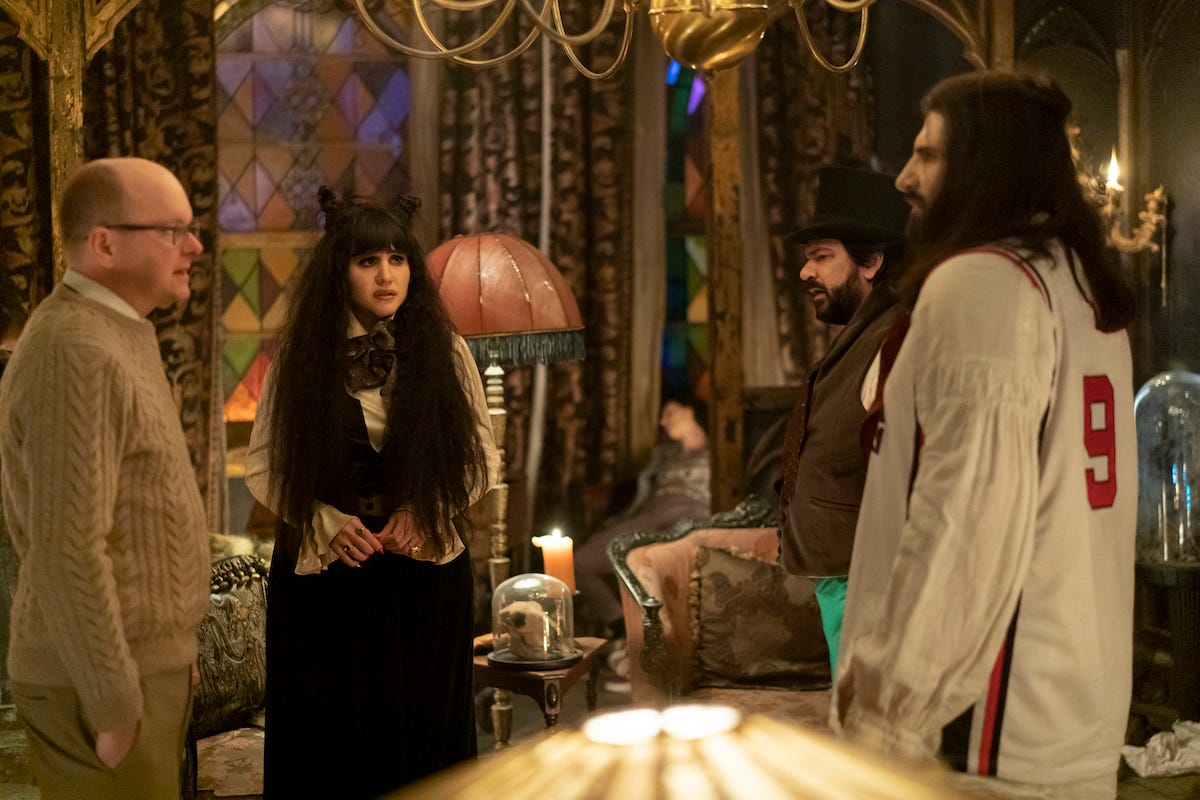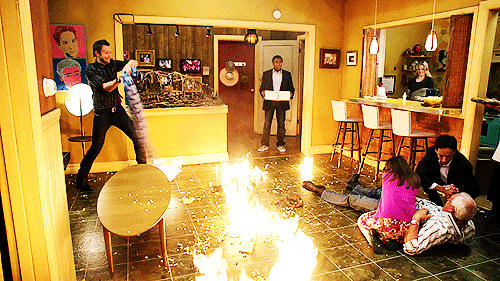HAPPY THANKSGIVING EVERYONE, hope you’re enjoying a well-deserved break. Folks seemed to enjoy last week’s streaming churn guide (featuring Max, Netflix, and the Criterion Channel), so we’re back with Part Two this week. As a reminder, the idea here is to select a couple of shows you can watch in a month or two before switching services and picking up a new streaming service to binge shows on. This week’s services are Apple TV+, Hulu, and Peacock.
Apple TV+
Apple TV+ is probably the closest thing we have to old-school HBO in the current iteration of the streaming wars: They don’t have a ton of shows, but the shows they do have are all pretty damn great. Oh, and don’t worry: I wrote a couple of months back about Slow Horses and how it’s the best show on streaming. So don’t think I’ve forgotten Gary Oldman’s spy series in the list to come. I’ll also assume that everyone has seen Ted Lasso, since it’s more or less Apple’s only show to make the major charts.
Also, as a heads up: If you’ve bought an Apple product in the last few years, odds are you have an offer for several free months of Apple TV+. It is very much worth taking advantage of this offer, trust me.
Mythic Quest
Length: Three seasons, 30 episodes, typically 25–30 minutes per episode
Premise: A workplace comedy from It’s Always Sunny in Philadelphia’s Rob McElhenney, Charlie Day, and Megan Ganz about a video game company headed by visionary creator Ian Grimm (McElhenney) and kept running by virtuoso programmer Poppy Li (Charlotte Nicdao), who come to realize they not only need each other but all the amusing weirdos in their orbit.
Highlighted Episode: “Dinner Party” (Season One, Episode Three)
Look, I’ll be straight with you: The best episode of the first season, and maybe the show, is “A Dark Quiet Death.” However, it’s unrepresentative of what the rest of the show is like. So I’m instead going to recommend “Dinner Party,” in which the Mythic Quest team realizes that Nazis are flocking to their game and must come up with a novel way to figure out how to ensure that the image of the brand isn’t destroyed by being affiliated with white supremacists.
Best Supporting Character: Brad Bakshi, Head of Monetization
Played by Danny Pudi, best known for portraying Abed in Community, Brad is the sort of amoral cretin who is both the bane of the entertainment industry’s existence and the only reason it keeps running. Sure, his methods are unsound. But who are the employees at Mythic Quest to question them as long as they’re cashing bonus checks?
Severance
Length: One season, nine episodes, typically 45–55 minutes per episode
Premise: Mark (Adam Scott) undergoes a radical procedure that essentially separates his work life from his personal life: He does not remember his personal life at work and does not remember his working hours when at home. Needless to say, this is not what therapists mean when they recommend maintaining a work-life balance, which is probably why new hire Helly (Britt Lower) is so desperate to escape.
Highlighted Episode: “Good News About Hell” (Season One, Episode One)
This is very much one of those shows that you just need to watch from start to finish: the world builds slowly but surely, revealing its mysteries to those who are willing to pay attention. And you do need to pay attention; this isn’t a show you half-watch while scrolling on your phone. If you don’t note who is doing what and where, you’re sure to miss something when the show shifts settings halfway through. Season two is scheduled to start January 17, so now’s the perfect time to catch up.
Best Supporting Character: Dylan George
This was the hardest entry I’ve had to write, because there are so many wonderfully memorable characters on Severance, from the preternaturally perky security man Mr. Milchick (Tramell Tillman) to Mark’s brother-in-law and would-be self-help guru Ricken (Michael Chernus) to Irving and Burt, played by John Turturro and Christopher Walken, respectively. But I have to go with Dylan George, whom Zach Cherry plays with a sort of officiousness early in the season that curdles into desperate longing as the episodes progress. His closing moments in the eighth episode are both bizarre and weirdly fitting and mildly terrifying; the whole thing calls to mind certain sequences in Eyes Wide Shut, minus the extravagant nudity.
Other Apple TV+ Shows to Watch: Sugar, Bad Monkey, Hijack, Dark Matter, Physical, Palm Royale
Apple TV+ Films to Watch: Greyhound, On the Rocks, The Tragedy of Macbeth, Tetris, The Family Plan, Napoleon, Killers of the Flower Moon, Wolfs
Hulu
Hulu is, possibly, the most underrated of the streaming services, in large part thanks to the addition of FX a few years back. This has created some weird branding issues—trying to explain to folks why the majority of Alex Garland’s brilliant, mind-bending show Devs (which we reviewed on a very early episode of Across the Movie Aisle) was only on streaming despite the first couple of episodes appearing on the cable network was very taxing back in 2020—but it’s worth it, as Hulu is now a one-stop shop for great shows like The Shield, Fargo, Justified, and more.
I’ll list a bunch of those classic shows from cable TV’s golden age at the end of this section; they’re all worth checking out. For now, I’m just going to highlight two of my favorites that feel a bit underappreciated and may have been lost in the streaming shuffle these last few years.
Reservation Dogs
Length: Three seasons, 28 episodes, typically 25–30 minutes per episode
Premise: Elora (Devery Jacobs), Bear (D’Pharaoh Woon-A-Tai), Cheese (Lane Factor), and Wilhelmina (Paulina Alexis) are four teens living on a Muscogee reservation wrestling with their place in the world and trying to come to terms with one of their friends having committed suicide before the show begins.
Highlighted Episode: “Decolonativation” (Season Two, Episode Six)
I don’t like recommending episodes this far in to a show without any precursors, as there are relationship cues you’ll miss if you haven’t watched previous episodes. But this remains my favorite episode of Reservation Dogs in no small part because it perfectly captures the complete hollowness of modern “influencers” who attended Ivy League schools and latched on to the language of oppression without understanding what it means to those who actually live the lives they’re discussing. Top-notch comedy throughout this 2022 episode that also served as a big flashing warning sign to an audience that needs to hear that a certain way of speaking about identity is rapidly going out of style.
Best Supporting Character: William “Spirit” Knifeman
One of the funniest running bits on the show is the appearance of William Knifeman (Dallas Goldtooth), an Indian warrior slain at Little Big Horn who shows up to impart words of wisdom to Bear. However, he’s not the typical, stoic spirit; he’s kind of goofy, has his own problems, and is sometimes more trouble than help.
What We Do in the Shadows
Length: Six seasons, 61 episodes, typically 22–25 minutes per episode
Premise: Three blood-sucking vampires from the Old World—Nandor the Relentless (Kayvan Novak) and the married couple Laszlo Cravensworth (Matt Berry) and Nadja Antipaxos (Natasia Demetriou)—live with energy vampire Colin Robinson (Mark Proksch) and Nandor’s familiar Guillermo (Harvey Guillén) in modern-day Staten Island, navigating the worlds of vampire and human alike with mixed success.
Highlighted Episode: “Werewolf Feud” (Season One, Episode Three)
What We Do in the Shadows is based on a film of the same name and it’s one of the few television shows to markedly improve on the source material. (I’m sorry, I know the original mockumentary has many fans and I’m sure they’ll yell at me but that film really wears out its welcome despite being just 80 minutes long.) A big reason for the show’s success is the introduction of Colin Robinson and the idea of “energy vampires,” creatures who both cause and feed on the boredom and despair of those around them, and this episode is a fairly representative example of what Colin Robinson (always two names) brings to the table.
Bonus Highlighted Episode: “On the Run” (Season Two, Episode Six)
The other reason this show is superior to its original incarnation is the work of Matt Berry, one of the funniest people in all of television. (If you’ve never seen Toast of London, you really must; it’s streaming on BritBox. Seriously, Berry does things with pronunciation that would make Christopher Walken say “Hey that’s . . . good, work.”) In this episode, Berry’s Laszlo goes on the lam because he doesn’t want to repay a century-old debt to a vampire played by Mark Hamill, eventually settling and working in a bar under the name of Jackie Daytona.
Best Supporting Character: The Guide
Kristen Schaal plays the Guide, who works for the Vampiric Council and wavers between wanting to help the quartet and hoping for their demise. This is one of these roles that’s really only funny because Schaal’s face has this natural look of annoyed incredulity, like she can’t believe she’s forced to deal with these people on a regular basis. Just a perfect piece of casting.
Other Hulu Shows to Watch: I could probably list a dozen shows here from the FX tab alone. But some of my favorites: It’s Always Sunny in Philadelphia, Fargo, The Shield, Atlanta, The Americans, Shogun, The Bear, and Justified. Also worth watching despite not being an FX original: Only Murders in the Building.
Peacock
Peacock is an interesting service in that I find myself using it for original programming less than as a substitute for NBC proper. Which is to say that what I find myself watching most frequently are Sunday Night Football and old NBC programs (as well as a raft of Universal movies that find their home here, particularly the kiddie-oriented fare put out by Illumination) rather than original programming like The Day of the Jackal (about which I’ve heard good things, I just haven’t had time to watch). Still, I’ll include an original in this roundup, as well as one of my favorite classic NBC shows.
Poker Face
Length: One season, 10 episodes, typically 50–60 minutes per episode
Premise: Charlie Cale (Natasha Lyonne) is a poker whiz whose innate ability to sniff out a lie makes her an unlikely detective as she crosses the country attempting to flee a vengeful casino owner.
Highlighted Episode: “Time of the Monkey” (Season One, Episode Five)
Poker Face is in the vein of Columbo: We see a crime take place, we see the person or people who commit the crime, and then we watch Charlie go to work and try to see how she’s going to catch them as well as come to understand why the criminals did the deed in the first place. (This type of show is sometimes referred to as a “howcatchem,” the inverse of a “whodunit.”) In this episode, we meet some elderly hippies living in a retirement home and see them kill one of their former comrades, and learn alongside Charlie why aging radicals remain one of our greatest threats.
Best Supporting Character: Michael Graves
One of the great pleasures of this show is the plethora of guest stars, the recognizable actors who pop in for an episode, either kill someone or get killed, and then go about their business. And it was the greatest pleasure to see Tim Meadows pop up as Michael Graves in “Exit Stage Death,” as Meadows was always one of my favorite SNL stars and has been decidedly underused by Hollywood in recent years.
Community
Length: Six seasons and a movie. (Maybe.) Episodes ran 22 minutes for the first five seasons (network TV, baby!) and 24–30 minutes for the sixth season (Yahoo! TV, baby!).
Premise: Disgraced lawyer Jeffrey Winger (Joel McHale), would-be psychologist Britta Perry (Gillian Jacobs), autistic film student Abed Nadir (Danny Pudi), mother and aspiring restauranteur Shirley Bennett (Yvette Nicole Brown), Type A recovering addict Annie Edison (Alison Brie), Type B recovering jock Troy Barnes (Donald Glover), and Type Racist Pierce Hawthorne (Chevy Chase) become fast friends at Greendale Community College where they get into a series of adventures that mimic genres and plots of the media consumed by Abed.
Highlighted Episode: “Remedial Chaos Theory” (Season Three, Episode Four)
The most impressive thing about Community is how incredibly dense every episode is. As in, heavy with plot, heavy with concepts, and, most importantly, heavy with jokes. “Remedial Chaos Theory,” released in 2011, demonstrates the show firing on all cylinders. The gang has gathered for a housewarming party at Troy and Abed’s new place and, when the pizza arrives, Jeff suggests they roll a die to see who has to go down and pick it up. Rolling the die creates a series of multiverses—six outcomes mean six different possible futures—and we run through all of them, a cascading pileup of callbacks and sight gags and one-liners, all stuffed into 21 black-hole-dense minutes of TV. No wonder Rolling Stone picked it as the fifteenth greatest episode of TV ever.
Best Supporting Character: Vice Dean Robert Laybourne
Community is another show with an embarrassment of guest star riches. Do I pick Michael K. Williams’s cranky ex-con professor? Or Andy Dick’s repeated appearances as one of Pierce’s drug-induced hallucinations? Betty White as an anthropology professor? John Oliver as a drunk Brit? But I had to go with John Goodman’s dean of the air-conditioning repair school, a man who reveals himself to be the real power at Greendale as the show goes along. His booming presence and absurd fiefdom form the perfect combination of hilarious and absurd.
Other Peacock shows to watch: Yellowstone, 30 Rock, The Office












How can you not mention Shrinking? I just discovered this week and watched it all. It’s delightful! Also, Peacock brought back Homocide: Life on the Streets. That’s definitely worth paying for a month or two of the service.
"What We Do in the Shadows" is hilarious. I've seen every episode, and the writing and acting are top-notch. The recurring guest role of "The Baron", played by Doug Jones, is one of the funniest sit-com characters I've ever seen. Every word out of his mouth has me in stitches.